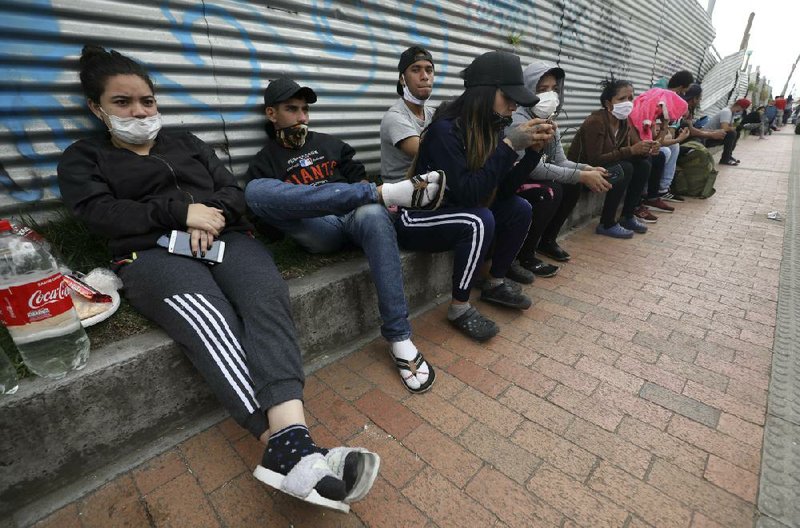CARACAS, Venezuela -- After fleeing Venezuela along with millions of others amid the country's grueling humanitarian crisis, Misael Cocho made his way by bus to Peru -- where he got odd jobs and sent money home monthly to support his mother and 5-year-old son.
But just after Cocho landed his steadiest work so far in Lima, coronavirus cases skyrocketed. He lost his job, sold his TV to buy food, and for months hasn't been able to wire money to Caracas.
The pandemic's economic fallout left many Venezuelans abroad and the relatives back home who rely on them in dire straits. And as work disappears in countries like Peru and Colombia, humanitarian groups say many Venezuelans who fled hunger are now going hungry.
Cocho, 24, faces a dilemma: Should he stay in Peru in case the economy improves, or go back to Caracas where life is precarious but might not get worse?
"The truth is that this pandemic has really hit me hard," he said.
Venezuela's population peaked at 30 million in 2015, but 5 million alarmed at the country's economic implosion migrated elsewhere in South America and to the U.S. and Europe, according to the U.N.'s International Organization for Migration. Most who stayed behind get by on a minimum wage that's the equivalent of about $2 a month.
[Gallery not loading above? Click here for more photos » arkansasonline.com/511venezuela/]
About half of the Venezuelans who emigrated to other South American countries are so-called "informal" sector workers -- laborers, vendors, street performers and waiters, estimated Provash Budden, regional Americas director for the Mercy Corps humanitarian aid group. Those jobs were hit hard by the virus's economic impact, and there are few if any social safety nets to help the people who had them.
Cocho first found work in Peru shoveling manure and sweeping streets and recently landed a better-paying job at a family-owned corner store. But he was laid off as the coronavirus spread. Peru has about 65,000 confirmed cases and, with more than 1,800 deaths, the second highest Latin American death count after Brazil.
He sleeps on a mattress in a crowded home filled with Venezuelan migrants. The landlord has let him skip the rent so far, but Cocho doesn't know how long the generosity will last.
"I've had no other choice but to sell the things I don't use in order to get by," he said.
Venezuela was once a wealthy nation sitting atop the world's largest reserves of oil. But years of political confrontation, corruption and resource mismanagement by the socialist government left most Venezuelans with increasingly scarce water, electricity, gasoline and inadequate medical care.
Of the 15% of Venezuelans who abandoned their country, about 1.8 million went to neighboring Colombia. Others headed to Brazil, Ecuador and Peru. Those who found more success than informal sector workers started businesses and enrolled their children in schools.
But the coronavirus abruptly halted many migrants' aspirations and limited their ability to help economically hurting relatives back home.
"Like everyone here, my mission in Peru has been to help my family in Venezuela," Cocho said.
Because of Colombia's strict stay-at-home order for the pandemic, many migrants in Bogota must break the law to go outside and make money to buy food or stay behind closed doors and go hungry, aid groups said.
"All of a sudden, they've become invisible, locked away behind closed doors," said Marianne Menjivar, director for Colombia and Venezuela for the International Rescue Committee humanitarian aid group.
About 20,000 Venezuelans have gone home since early March, according to Colombia's government, which has paid for about 396 bus trips to take them to the Venezuelan border.
Venezuela has so far reported only 402 cases of coronavirus and 10 covid-19 deaths.
In Caracas, Cocho's mother, Maylin Perez, 48, says the potential spread of the virus weighs on her heavily.
She lives up several flights of stairs in a spartan, three-room apartment with old photos of her son on the walls. Cocho last sent his mother $10 in a February wire transfer that helped buy groceries.
So she knits colorful face masks to barter for extras besides the lentils and rice from a monthly government-subsidized box of food she usually eats with her grandson. They can't afford eggs, cheese or meat.
[CORONAVIRUS: Click here for our complete coverage » arkansasonline.com/coronavirus]
Perez said the highlights of her days are the text messages from her son, who also calls every few days so the boy can hear his father's voice.
Information for this article was contributed by Cesar Olmos and Cesar Garcia of The Associated Press.
A Section on 05/11/2020
